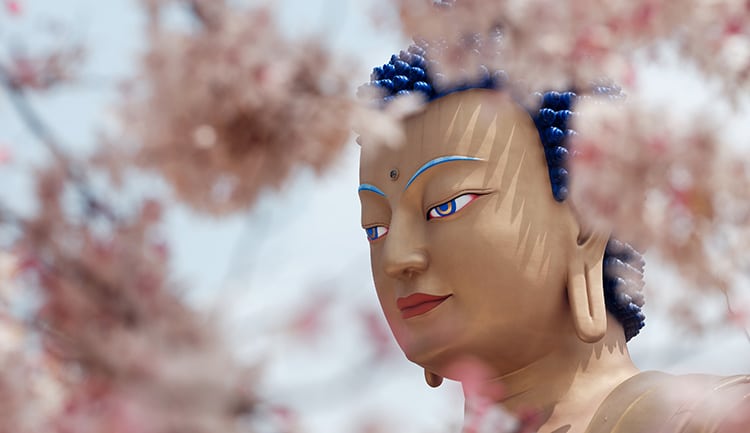How Do You Reach Nirvana?
Category: Buddhist Path

The Meaning of Nirvana in Buddhism (End of Suffering Explained)
The various Buddhist traditions differ in their interpretation of nirvana, but in general, nirvana is the ultimate goal of Buddhist practice. Although beyond words, we might describe nirvana as a cessation. Nirvana represents the end of suffering and complete liberation from the karmic cycle. In some Buddhist traditions nirvana is synonymous with enlightenment. Others view it as a significant step along the way to full Buddhahood.
Nirvana is a Sanskrit word that may be translated as extinction. In Theravadan Buddhism it is often referred to in the Pali language, as nibbana. So, what is it that goes extinct when we reach nirvana? Nirvana is the cessation of samsara, the endless cycle of death and rebirth that we experience as suffering.
If we find the notion of rebirth challenging, that’s ok. We can see evidence of samsara in this one life. Despite our best efforts at getting what we want and avoiding what we don’t want, our satisfaction is short lived. We feel trapped in a never-ending cycle of wins and losses, destined to always be striving for more.
To experience nirvana is to experience total freedom from the hamster wheel of unenlightened living. Gone is our suffering and its causes. We’re fairly adept at finding temporary relief for life’s pains. To reach nirvana, however, is to find a permanent solution. It is the end of suffering and the end of future suffering, in this life and the next.
What Causes Nirvana?
Buddhist teachings on nirvana and enlightenment begin with the teachings on the four noble truths. These teachings remind us that because the pain we experience has a karmic cause, there is also a cause to its cessation.
The question might then become, not ‘How do you reach nirvana?’, but ‘What causes nirvana?’ Nirvana is not a far-off place but a state of being, an experience we can access right here and now. It is caused by overcoming the perpetual reactivity that drives us to repeat our past mistakes. Following a practice of awakening liberates us by opening our eyes to the true causes of happiness.
The causes of this freedom are encompassed within the three-fold training of ethics, meditation and wisdom. By minimizing harm, training our minds and developing the capacity to see things as they truly are, we create new causes and conditions that give rise to the Buddha within – the discovery of our own Buddha nature.
Nirvana versus Enlightenment
In some Buddhist traditions, there is a difference between nirvana and enlightenment, or bodhi. While nirvana is the cessation of suffering, bodhi signifies full enlightenment. It is a continued process whereby we become a Buddha with the intent to help liberate all others from their pain, too.
As we progress along any authentic spiritual path and our lives become more joyful, it’s only natural to want to share that happiness with others. This is how bodhicitta, the awakened heart, begins to develop. A bodhisattva, although fully capable of never taking another rebirth, intentionally returns to samsara until all beings everywhere are liberated. This ultimate expression of compassion is bodhicitta.
Experiencing Nirvana
Meditation can give us a taste of nirvana. By observing our experience without judgment, we learn there’s actually no need to react to it or change it. We learn to relax and let go of our attempts to grasp or avoid things. It feels good when we realize we can be ok (and even happy) in this moment, just as it is.
At first, the peace we get from meditation is soon forgotten as we go about our busy day. With practice, however, we can reach a point of no return in which we never forget. This is nirvana.
In a practical sense, signs of spiritual enlightenment and awakening may include the following:
- You become less attached to people, places and objects
- You become less avoidant and more capable of being present with your pain
- You become less reactive and more emotionally stable
- You start letting go of your past story, and allow for change
- You become less judgmental and more open minded
- You begin to see things as they are, versus as you are
- You feel less separate and more connected to others as well as to the earth
- You become more trusting of your intuition
- Your teacher presents themselves to you
- You become more aware of the suffering of others
- You feel driven to help others experience nirvana, too
To experience nirvana is to have realized our Buddha nature. In nirvana, we experience life and this world as a Buddha would, completely liberated from the past conditioning that has caused us to think we were ever anything but enlightened.
This is a mode of being that is beyond words, only fully understood by the one who experiences it. We do know that it’s possible, however, for the Buddha was once a suffering human too.








